[ad_1]
Learn the easiest ways to serve bananas for babies from the time they start solids to when they’re on into toddlerhood. With tips on banana puree, baby led weaning bananas, which bananas cause constipation (and don’t!), and banana recipes to try.
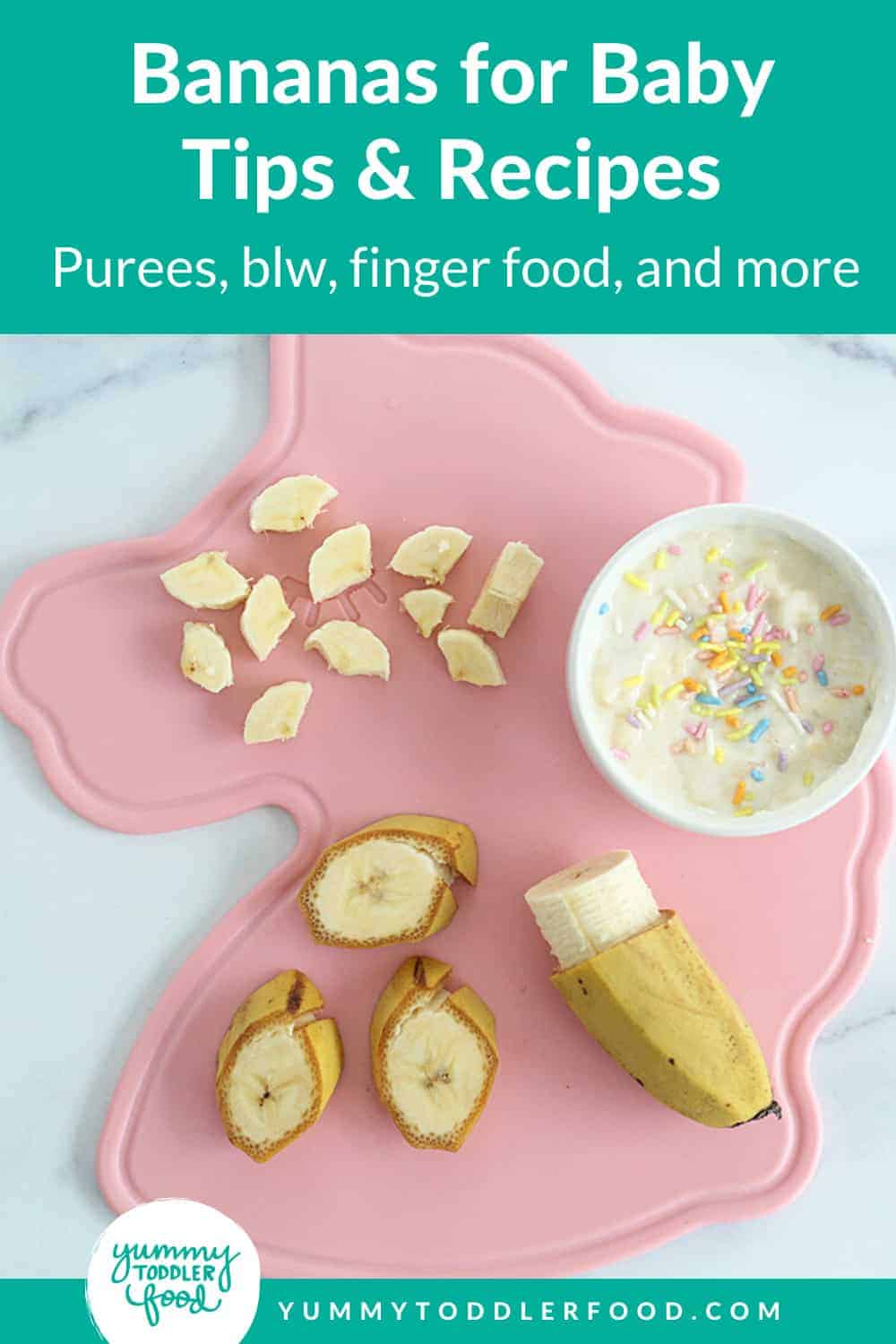
Bananas for Baby
Banana is one of those classic easy baby foods since the flavor is mellow and mild and they are so easy to prepare. I know that there are common questions when offering them though, so I hope to help clear up any confusion. This post is meant to offer ideas whether you do purees or baby led weaning, have a baby just starting solids, an older baby, or even a toddler.
Bananas are rich in potassium, Vitamin B6, fiber, Vitamin C, among other nutrients. They range in flavor and sweetness—but they are a carbohydrate that’s classified as a “resistant starch” so they cause less glucose to be released into the bloodstream. Which basically means they don’t cause quick spikes in blood sugar since they are digested slowly.
(I mention that since many are wary of bananas due to their sugar content, but we don’t need to worry about the natural sugars in fruits—especially not when they’re naturally paired with fiber which helps slow the rate of digestion.)
Bananas should be stored at room temperature and are best eaten when ripe. It can be sometimes hard to know when a banana is ripe, but I look for yellow fruit with just the some brown dots. You or your kids may prefer riper or less ripe bananas.
Bananas with more brown spots have more natural sugars and flavor, which. makes them a more flavorful option to offer.
(You usually want to use very brown bananas for baked goods that call for bananas.)
How to Prepare Bananas for Baby
There are a handful of ways to offer fresh bananas to baby that may depend on baby’s age and your comfort level with the style of feeding you’re doing. You can serve bananas to baby in the following ways:
- Banana puree
- Big piece of banana as a baby led weaning food
- Broken or cut into small pieces as a finger food
- Mashed and stirred into oatmeal, yogurt, or another puree
- Baked into muffins, pancakes, or another baked good
- Blended into a smoothie
TIP: You may also like Apples for Baby and this guide to yogurt and babies.

Banana Puree
Classic banana puree is made by pureeing ripe banana in a blender until very smooth. This is an easy and delicious baby food option for babies in the Stage 1 baby food phase, or typically around age 6 months.
You can progressively puree it less smooth so baby can adjust to a thicker texture or move to mashing with a fork.

What to Mix with Banana Baby Food
You can use banana puree or mashed banana to make a wide range of baby food combinations. Some of my favorite purees and foods to mix banana with are:

Banana for Baby Led Weaning
Banana can be a really easy baby led weaning food. (That’s my little guy trying banana for the first time when we were on a hike. I hadn’t planned on sharing, but he was so into it. I held it for him and let him suck on it.)
You can cut a banana in half, then remove about 1 inch of the peel so baby has plenty of the fruit to try but it wont be slippery since they can hold the peel.
You can also help hold it for them as needed.

Bananas for 6 Month Old
For a 6-8 or 9 month old baby, you can offer banana as puree, mashed smooth (or mostly smooth) with a fork, or baby led weaning style as a large piece.
You can do one option or try more than one. There’s no one right way to start solids.

Bananas for 9 Month Old
At 9 months old, babies can typically eat soft finger foods including bananas. You can dice them up or slice, then push a little to break into their natural segments. This is usually less slippery for baby to pick up with their fingers.

Bananas for 12+ Months
Over about a year, or when baby can take bites and manage larger pieces of food, you can serve bananas almost any which way. We love to slice them with the peel on, then cut a little slit in the peel, then let the kids peel them on their own.
That small amount of engagement with the food can really help a child become interested in it. Give them a place to put the peels, like a little bowl, too.
Frequently Asked Questions
A baby’s appetite should be trusted, so baby can have as much banana as you have to offer and they are interested in unless there is an adverse effect. Start with offering a smaller portion to avoid food waste and allow more as baby cues.
Bananas contain a type of carbohydrate that is a slow releasing starch. This means that the natural sugars are digested more slowly so it’s less likely to cause a sugar spike. It is an easy and affordable bedtime snack.
Unripe bananas can aggravate constipation. It is less of a concern with very ripe bananas, which are rich in soluble fiber. (Pair it with liquids or healthy fats to help it move through the system if you are at all concerned.)
Banana Recipes to Try
Use a ripe banana with at least some brown spots for the best flavor in this puree.
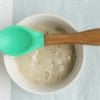
This recipe make enough for 2-4 servings of yogurt, depending on the appetite of your child. See the Notes at the bottom for storage tips if you have leftovers. You can also cut the recipe in half to make a smaller amount.
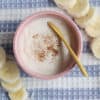
This makes one small batch which will be 1-2 little-kid-size servings. To make more, simply double the recipe. These are delicate pancakes with a texture that’s sort of custardy like French toast. They are NOT like regular pancakes in that they are not super bready. Which is to say: Be gentle when flipping them. I broke a few the first time I made them! See the NOTES for the flavor variations.
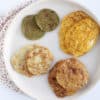
Very ripe (with brown spots) bananas will give these pancakes the best flavor. Dice them up or serve whole, according to how the kids prefer to eat them.
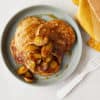
This is a thin batter that makes tender pancakes. Be sure to let them cook until the surface is almost entirely firm before you flip them over.
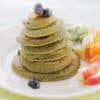
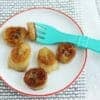
Be sure to use very ripe bananas (with lots of brown spots!) for the best flavor and natural sweetness. (I updated this recipe December 2020 to ensure the most reliable results. The original version of this recipe is the “Egg-free” option in the Notes if you loved that. In the main recipe, I reduced the oil, added an egg, increased the baking soda a smidge, and reduced the baking time. They’re great!)
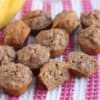
Frozen bananas give the smoothie a creamy, naturally sweet base, though you can make this with a fresh banana as long as the other fruit is frozen. It’s easy to add whatever berries or fruit you have on hand, so customize it for your kiddo.
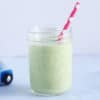
These are an easy whole grain cookie to share with the kids—they’re a great baby cookie! Try them for snack, dessert, or as a breakfast cookie
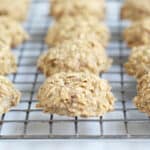
When you use a really ripe (or over ripe) banana in this recipe, it tastes so much like banana bread—but is much faster! See the options for which toppings make this even more delish.
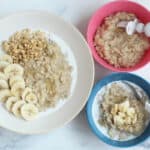
Best Tips for Success
- Follow baby’s lead when it comes to appetite.
- Avoid underripe bananas if concerned about constipation.
- Try Banana Puree, mashed bananas or baby led weaning style bigger pieces of bananas for babies around age 6 months.
- Once a baby is about 9 months and can pick up small pieces of food, you can offer smaller pieces of banana.
- Banana pieces should be soft and ripe, rather than unripe and too hard.
- Try bananas in smoothies, oatmeal, yogurt, pancakes, and muffins.
- You may also like Apple Puree, Carrot Puree, ABC Muffins, and my Master List of Baby Food Recipes.
I’d love to hear your feedback on this post, so please comment below to share!
[ad_2]
Source link
